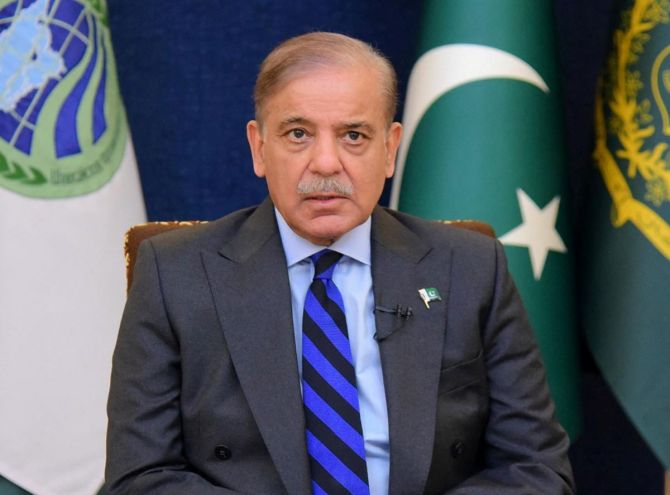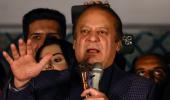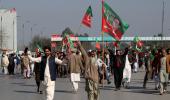Shehbaz Sharif, the younger brother of former premier Nawaz Sharif, is expected to become Pakistan's next prime minister as a post-poll alliance of leading political parties led by them struck a deal to form a coalition government after last week's elections produced a split mandate.

The surprise move means the party of jailed former Prime Minister Imran Khan will not be in power, despite independent candidates backed by his Pakistan Tehreek-e-Insaf winning the maximum number of seats in Parliament in the February 8 elections marred by allegations of rigging.
Pakistan Muslim League-Nawaz on Tuesday night nominated 72-year-old Shehbaz as the prime ministerial candidate instead of the party supremo and three-time former premier Nawaz Sharif.
The 74-year-old veteran politician, who was seeking a record fourth term as prime minister, returned to Pakistan in October last year after ending a self-imposed exile in the UK.
Earlier, Shehbaz along with Asif Ali Zardari of Pakistan Peoples Party, Khalid Maqbool Siddiqui of Muttahida Qaumi Movement Pakistan met at the residence of Shujaat Hussain of Pakistan Muslim League-Quaid for a consultative meeting and agreed on government formation.
“Today we have united to tell the nation that we all accept the split mandate. I am thankful to Zardari and Bilawal (Bhutto) that they decided for their party to vote for the PML-N,” he said.
PML-N Information Secretary Marriyum Aurangzeb has said that party supremo Nawaz Sharif has nominated the party president and his younger brother Shehbaz Sharif for the post of the country's prime minister.
She added that PML-N Senior Vice President Maryam Nawaz, considered the political heir of Nawaz Sharif, was nominated for the post of the chief minister of Punjab province.
Earlier on Tuesday, the Pakistan Peoples Party chairman Bilawal Bhutto Zardari said he was withdrawing his bid to become the prime minister and his party would support the PML-N candidate for the top post.
"Nawaz Sharif has thanked the political parties which provided support to the PML-N (in forming the upcoming government) and expressed hope that through such decisions Pakistan will come out of crises," she said.
Shehbaz, who was prime minister after the Imran Khan-led government was ousted in April 2022, said the other parties that joined hands with the PML-N enjoyed “almost 2/3 majority” of the Parliament after the elections. He also said that the new government would pull the country out of trouble.
Hours after Nawaz Sharif nominated Shehbaz for the post of prime minister, his daughter Maryam Nawaz on Wednesday sought to rebuff the impression that her father has quit active politics.
“In the next 5 years, Nawaz will not only participate in active politics but also oversee the PML-N-led governments in Punjab and at the Centre,” Maryam, also the PML-N senior vice president, said in a post on X.
According to the Election Commission of Pakistan's tally, the total number of general seats won by the six parties -- the PML-N, PPP, MQM-P, PML-Q, IPP (Istehkam-e-Pakistan Party) and Balochistan Awami Party (BAP) which announced their plans to form a coalition led by Shehbaz -- comes to 152.
This clearly shows that these parties will easily achieve the minimum required number of 169 to form the government at the Centre after the addition of 60 women and 10 minority seats in their tally.
“Now our war is against the country's challenges. The first challenge is the economy. We have to stabilise it which is a tall task. Nations move forward when their leadership unites and decides to end conflicts and take the nation forward to eliminate problems,” he said.
The PML-N reportedly enjoys the backing of the powerful Pakistan Army.
Reacting to the latest political developments, the PTI said that the best option for the PML-N is to “accept [its] defeat gracefully” and let their party founder Khan “fix and heal the country”.
Khan, a 71-year-old cricketer-turned-politician, is currently in jail and has been barred from running in the election due to his conviction in corruption cases.
Earlier, top PPP leader and former Pakistan President Zardari, speaking alongside Shehbaz, said that a coalition government would be set up.
“We have decided to form a coalition government and pull the country out of the economic crisis,” he said and added that the new government would also try to reconcile with everyone including Khan's PTI.
He promised to deliver the country out of these troubles and lead on to the road to prosperity.
With the key parties getting together to form the new government, the transition from the election to the new government is likely to take place by the end of this month.
Khan and his party have continued to emphasise that they believe the elections were rigged against them and plan to challenge the results.
Speaking to reporters in court for the first time since the vote, Khan said: "I warn against the misadventure of forming a government with stolen votes.
"Such daylight robbery will not only be a disrespect to the citizens but will also push the country's economy further into a downward spiral."
Meanwhile, Khan-led PTI decided to use the platform of two right-wing religious parties in its bid to form its federal government in Islamabad and in the provinces of Punjab and Khyber-Pakhtunkhwa.
“PTI has decided to join Majlis Wahdat-e-Muslimeen to form the government in the centre and in Punjab and Jamaati-e-Islami in Khyber-Pakhtunkhwa,” the party's information secretary Raouf Hassan said. He said the party was redoubling efforts to form a government at the Centre and in Punjab province.
It is believed that by even joining the two parties, the PTI would not get enough strength to form the federal government or provincial government in Punjab.
By joining the two parties, the PTI would be able to claim a share of the 70 reserved seats in the National Assembly and 156 reserved seats in the four provincial assemblies. The reserved seats are allotted to the parties based on proportional representation.
The PTI-backed independent candidates were required to join a political party within three days of official notification of the election results by the Election Commission of Pakistan, which has not been issued so far.
The overnight developments showed that the country was on the way to getting an elected government in office within weeks after the February 8 polarised elections.











 © 2025
© 2025